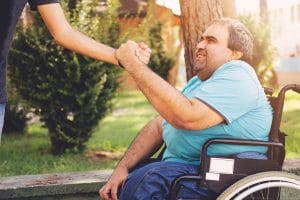How Do People with Disabilities Navigate Society?
 Not all human beings are the same; many human beings live with and deal with disabilities. State and federal laws provide protections – protections against discrimination, for assistance, and more – to people with disabilities in certain situations. Nevertheless, the legal protections do not answer this existential question: How do people with disabilities navigate society?
Not all human beings are the same; many human beings live with and deal with disabilities. State and federal laws provide protections – protections against discrimination, for assistance, and more – to people with disabilities in certain situations. Nevertheless, the legal protections do not answer this existential question: How do people with disabilities navigate society?
Navigating society often is difficult for people with disabilities. Nevertheless, not all individuals with disabilities have the same disabilities or experience the same hurdles. Some individuals have physical disabilities, and others have mental disabilities.
Some people with physical disabilities have trouble walking or eating, and they may require assistive devices, such as canes, or require their food to be cut into smaller pieces. In addition, some people with physical disabilities have trouble entering and exiting doors or crossing streets. Other people with physical disabilities have trouble seeing, so they wear eyeglasses, rely on their other senses, or have service animals.
Some people with mental disabilities have difficulty attending school or landing work and/or find it unsettling to interact with others. To combat their trouble with work, at school, and/or in social interaction, people with mental disabilities may receive assistance in the form of modifications, accommodations, therapy sessions, and/or medications.
Some people born with disabilities have good handles on their disabilities; they have experienced the ups and downs of their disabilities. Other people born with disabilities suffer, feel as if they do not fit in society, and have trouble dealing with work, personal, and social relationships.
Often, those with disabilities require more time to accomplish personal or work tasks or goals, and it may take much effort, perseverance, and energy just to attend to their needs.
People with disabilities, like everyone else, have dreams and goals, experience successes, and deal with disappointments. Most people with disabilities want fair shots and real opportunities. They do not seek to be pitied or praised, but they do desire to be respected and valued.
Regardless of whether people with disabilities are born with their disabilities or become disabled later in their lives, many people with disabilities have good handles on their disabilities, but there is always room for improvement. And no one knows what it is like for people with disabilities to navigate society better than people with disabilities.
If you have questions or concerns about legal protections for people with disabilities, talk to a lawyer. To learn more, to have your questions answered, and to have your concerns addressed, contact Nashville Attorney Perry A. Craft.

Perry A. Craft has dedicated his life to helping people in need. He has tried, settled, or resolved numerous civil and criminal cases in State and Federal courts, and has represented teachers and administrators before school boards, administrative judges, and the state Board of Education. Learn more about Attorney Craft.
